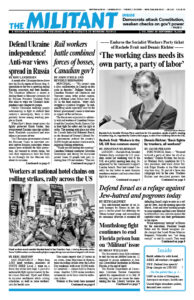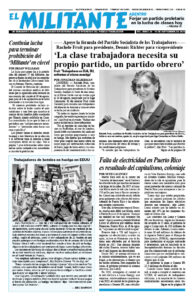MONTREAL — “We haven’t seen a class confrontation in Canada on this scale in decades,” Philippe Tessier, a Canadian National rail conductor and Teamster union strike picket captain, told a Militant Labor Forum here Aug. 24. In the final analysis, “every class struggle is a political struggle,” he said, something made especially clear by the federal government’s move to intervene in support of the rail bosses.
The forum was organized in solidarity with rail workers at Canadian National and the Canadian Pacific Kansas City in their fight for safety and the right to strike. The meeting took place just after the Canada Industrial Relations Board, on the demand of Ottawa’s Liberal Party government, ordered the country’s 10,000 freight rail workers back to work, imposing binding arbitration.
“Thank you for holding this meeting,” Canadian National conductor Sebastian Santamaria said during the discussion period. Some 30 people took part, including four CN rail workers. “The railway bosses make billions in profits with our work. I agree with you that working people need our own labor party.”
The two other panelists were Naomi Craine, a freight rail conductor in Chicago and member of the SMART-TD union, the largest rail union in the U.S., and Socialist Workers Party candidate for Congress from Illinois, as well as Michel Prairie speaking for the Communist League.
“Rail workers in the U.S. have similar safety issues as workers in Canada,” Craine said. She pointed to the recent death of a young conductor in Chicago who had just completed his training. “Two years ago, President Joseph Biden led a nonpartisan majority of Democrats and Republicans to bar rail workers from striking, saying it would damage the economy.”
Prairie pointed to the example of 55,000 Ontario union education workers who used their union power in 2022 to take on an attack by the bosses. They went on strike despite the provincial government declaring the labor action illegal. The workers won backing of the entire labor movement and made significant gains. Ontario’s Progressive Conservative government was forced to repeal the law banning their right to strike.
This is an important example, he said.
“Look at the power of the rail workers in this fight,” bakery union member Katy LeRougetel said during the discussion. “We begin to gain confidence and class consciousness we need to organize and change society through our experiences on the picket line.” LeRougetel is the Communist League candidate in the Sept. 16 Montreal federal by-election. Forum participants donated 223 Canadian dollars ($165) to her campaign.
The Teamster rail workers received widespread working-class support, across Canada and the U.S. “There is growing frustration among workers due to rising cost of living, economic inequities and lack of safety on the job,” said Lana Payne, national president of the Unifor union. Unifor is the largest private-sector union in Canada, with 315,000 members.
Union leaders representing dockworkers in Vancouver, Montreal and Halifax told reporters here Aug. 29 they are ready to mobilize against Ottawa if the government interferes in their industry the way it did in the railway lockouts.
“The decision sets a dangerous precedent for future labour disputes and sends a signal to Canadian companies that when negotiations get tough, the federal government will always come to their rescue to help them trample on their employees’ rights,” they said in a joint press release Aug. 28.
Three years ago, Montreal’s 1,150 longshoremen went on strike, causing the port, one of the busiest in Canada, to shut down. They were ordered back to work and forced to accept binding arbitration when the House of Commons passed an anti-strike law a few days after the start of the walkout.
Prime Minister Justin Trudeau has defended his government’s move to demand the Canada Industrial Relations Board impose binding arbitration and force an end to the rail strike. During an Aug. 28 speech to a meeting of the International Union of Operating Engineers in Winnipeg, Trudeau extolled his government’s track record on labor law and claimed the call for binding arbitration at the two railroads was made out of necessity, and “reluctantly.”
The Teamsters Canada Rail Conference filed a court motion seeking to quash the industrial relations board ruling ordering them back to work, saying the order infringed on the railway workers’ “associational rights guaranteed under section 2(d) of the Canadian Charter of Rights and Freedoms.”
Workers are looking for a way to fight.

